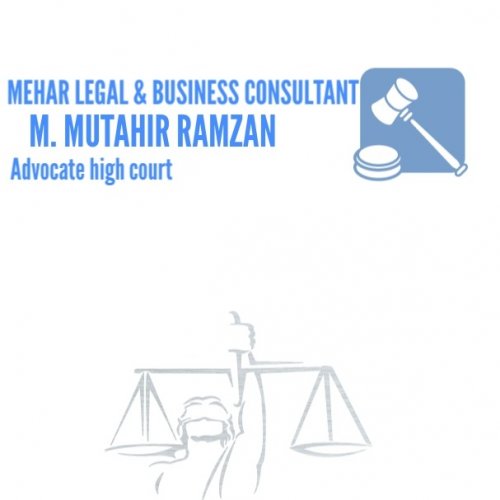Best Debt & Collection Lawyers in Islamabad
Share your needs with us, get contacted by law firms.
Free. Takes 2 min.
List of the best lawyers in Islamabad, Pakistan
Pakistan Debt & Collection Legal Questions answered by Lawyers
Browse our 1 legal question about Debt & Collection in Pakistan and read the lawyer answers, or ask your own questions for free.
- I need to send a legal notice of fraud
- I have given loan to a family and now they are not paying it back even after 3 years of wait. I need to send them a legal notice to settle the case in court if they will not pay it back. Is ot possible to first use legal notice... Read more →
-
Lawyer answer by Law Office Attorney SVETISLAV STOJANOSKI, LL.M.
Yes it is possible to first use legal notice.
Read full answer
About Debt & Collection Law in Islamabad, Pakistan
The domain of debt and collection law in Islamabad, Pakistan, focuses largely on the recovery of debts and obligations owed by individual debtors or businesses. The existing legal framework in Pakistan provides that unpaid creditors can recover their due amounts using both civil and criminal justice systems. However, the procedure can be complex, requiring extensive understanding and careful maneuvering.
Why You May Need a Lawyer
Joining a debt relief program, resolving a debt lawsuit, defending against illegal debt collection practices, or navigating bankruptcy can be contentious and complicated matters. A lawyer experienced in debt and collection law can help get the most favorable outcomes for these situations and more. They can help negotiate settlements, understand your rights under the local laws, and help protect you from harassment or predatory practices by debt collectors.
Local Laws Overview
Key aspects of local laws relevant to Debt & Collection in Islamabad, Pakistan include The Limitation Act of 1908, The Recovery of Mortgage-backed Securities Ordinance, and The Financial Institutions Ordinance. Together, they outline the statute of limitations for debt claims, the rights of creditors, and the process for recovering debt. Additionally, the laws allow for both civil and criminal actions against debtors under certain circumstances. Unlawful practices by debt collectors are also regulated and these laws seek to protect debtors from harassment and unfair treatment.
Frequently Asked Questions
1. What is the statute of limitations for debt in Pakistan?
The general time limit for filing a debt recovery suit, as per The Limitation Act 1908, is three years from when the debt becomes due.
2. Can interest be charged on a defaulted debt?
Yes, as per the Contract Act, 1872, interest can be charged on the principal amount of the debt as long as it's stipulated in a contract or agreement.
3. What are the consequences for refusing to repay a debt?
Legal action can be taken against those refusing to pay debts within the given timeframe. This could include being sued in court, getting assets seized, and other civil or criminal penalties.
4. How can a lawyer help in debt collection processes?
A lawyer can help you understand your rights, negotiate settlements, and represent you in court if need be. They can also protect you from harassment or unfair treatment by debt collectors.
5. Can a creditor garnish my wages in Pakistan to satisfy a debt?
Under certain circumstances and with a court order, a creditor may be able to garnish your wages. A qualified lawyer can provide more specific information based on your situation.
Additional Resources
Pakistan’s judicial system and various legal resources such as Law Firms, Bar Associations, and Pakistan’s dedicated legal portal LawyerPK can be helpful resources. Additionally, the State Bank of Pakistan also provides useful resources and guidelines pertaining to the recovery of debts and financial transactions.
Next Steps
If you're facing any challenges related to debt collection, you should immediately seek legal counsel. Look for a lawyer specializing in Debt & Collection law in Islamabad, as they'll have the best knowledge of local norms and practices. Be prepared to provide all pertinent information concerning your situation to assist your lawyer. Remember, delaying legal advice can often complicate matters, so it's essential to act promptly.
Lawzana helps you find the best lawyers and law firms in Islamabad through a curated and pre-screened list of qualified legal professionals. Our platform offers rankings and detailed profiles of attorneys and law firms, allowing you to compare based on practice areas, including Debt & Collection, experience, and client feedback.
Each profile includes a description of the firm's areas of practice, client reviews, team members and partners, year of establishment, spoken languages, office locations, contact information, social media presence, and any published articles or resources. Most firms on our platform speak English and are experienced in both local and international legal matters.
Get a quote from top-rated law firms in Islamabad, Pakistan — quickly, securely, and without unnecessary hassle.
Disclaimer:
The information provided on this page is for general informational purposes only and does not constitute legal advice. While we strive to ensure the accuracy and relevance of the content, legal information may change over time, and interpretations of the law can vary. You should always consult with a qualified legal professional for advice specific to your situation.
We disclaim all liability for actions taken or not taken based on the content of this page. If you believe any information is incorrect or outdated, please contact us, and we will review and update it where appropriate.











